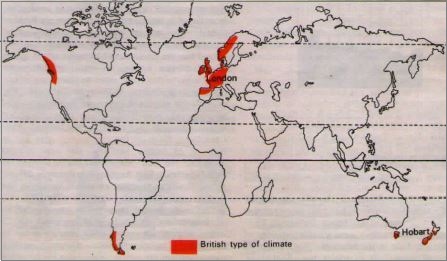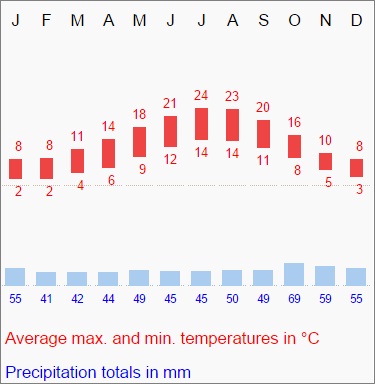British type Climate – Cool Temperate Western Margin
by Devender
0 2841
There is a permanent influence of westerlies all around the year on the cool temperate western margins at 50 Degree N-S. These regions are exposed to much cyclonic activity which is typical of Britain. That is why it is known as the British-type climate.
British type Climate – Cool Temperate Western Margin
The climatic belt stretches far inland into the lowlands of N-W Europe from Britain. It includes the region such as northern & western France, Belgium, Netherland, Denmark, Western Norway, and N-W Iberia.
- The temperature and precipitation are greatly influenced by the oceans
- Therefore, this climate is also known as northwest European Maritime Climate
- The high Rockies in Northern America prevent the onshore westerlies from penetrating far inland
- The British type of climate is confined to the coastlands of British Columbia
- British type climate:
- In this climate, heat waves are a welcome feature
- These features occur because of the moderating effects of the North Atlantic drifts and prevailing southern westerlies
- The invasion of cold polar continental air from the interiors sometimes causes unusual cold spells
- The western margins may be hit for a number of weeks
- In winters, snowfalls and night frost occur
- Natural Vegetation of British Type Climate:
- The deciduous trees occur in pure stands
- They have great lumbering value from the commercial point of view
- They are excellent for fuel, furniture and industrial purposes
- Logging operations are successful in the area because of the open nature of the forests with sparse undergrowth
- The movement of the logs is quite easy and hence, a lot of saving
- Agricultural Developments of British Type Climate:
- The high degree of fertility of the soil is carefully maintained
- Crops are provided with very selective fertilizers
- The main aim of this farming is high yield and maximum cash returns
- The next important cereal in mixed farming is Barley
- It is raised in drier areas
- It is used as a fodder crop but the better quality is sold to breweries for beer and whisky-making
- Denmark, Australia and New Zealand are some of the world's leading exporters of dairy products

This type of climate is present in southern Chile, Tasmania (Southern Australia) and major parts of New Zealand in the S-hemisphere. It is experienced particularly in the south island, surrounded by large expanses of water.
The annual temperature range is quite small because the temperature in winters is about 5 Degree C while in summers, it is around 15 Degree C. Summers are never really very warm and the temperature above 20 Degree C is very rare. The winters are very mild and there are no stations that record average temperature below freezing point.
Therefore, the climate of this region can be described wholly as moderately warm summers with fairly mild winters. This type of climate is more equable in the S-hemisphere because of the absence of continental mass and the presence of more oceanic water. It means temperature extremes are not much possible which results in further reduction in the annual temperature range.

The amount of rainfall decreases from the western margin of the continents eastwards. It is quite difficult to estimate the annual rainfall of this climate type because relief can also make a huge impact on rainfall. Although it is confined to only lowlands, the annual rainfall is 50 to 100 cm. It has adequate rainfall throughout the year and the rainfall is slight in winters with a maximum in autumn.
The natural vegetation of this climate type is deciduous forests. The trees of these forests shed their leaves in the cold season to protect themselves against winter snow and frost. The hardwoods are provided by Oak, Elms, Birch, Neech, Poplar, and Hornbeam along with other species such as chestnut, maple and lime.
Higher up the mountains in Scavandian highlands, the Rockies and the Southern Alps of New Zealand, the conifers that can survive higher altitude, low temperature and poor soil replace the deciduous trees.
N-W Europe is one of the most crowded parts of the world. That is why it has to import various food crops from all over the world despite growing a large number of cereals with the highest yield/acre. The agricultural developments of this type of climatic region are –
1 Market Gardening:
It is practiced in large urban population areas all over the world but it is highly specialized in N-W Europe (France, Belgium, Britain, West Germany, and Denmark). These farms are usually small and located near large cities or industrial areas.
It is also known as Truck Farming in the US as it produces potatoes, cauliflowers, lettuces, cabbages, tomatoes, onion, peas, and fruits that are conveyed by high-speed conveyances such as trucks or vans. Most of the industrialized areas of Europe receive Bulbs and flowers from the Netherlands, and eggs, bacon, and other dairy products from Denmark.
In Australia, vegetables, tomatoes, apples, and beans are rushed from Tasmania by high-speed boats that ply across the Bass Strait daily. It reaches most parts of the Australian mainland like this.
2 Mixed Farming:
Both arable and pastoral farming is practiced by farmers in Britain and N-W Europe. The crops are raised for cash sales or for fodder for cattle and sheep. Wheat is the most grown cereal and it is grown for home consumption entirely.
Potatoes feature prominently as a staple food crop among other food crops. In the current times, 2/3rd of the world's annual production of potatoes comes from Europe. Poland, Germany, France and Britain are the major producers of potatoes in Europe. Potatoes are mainly used as a substitute for bread. However, it also serves as animal fodder and a source of industrial alcohol.

Share:







Comments
Waiting for your comments